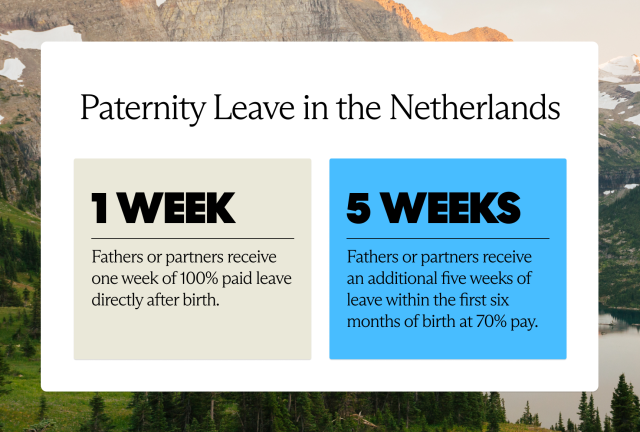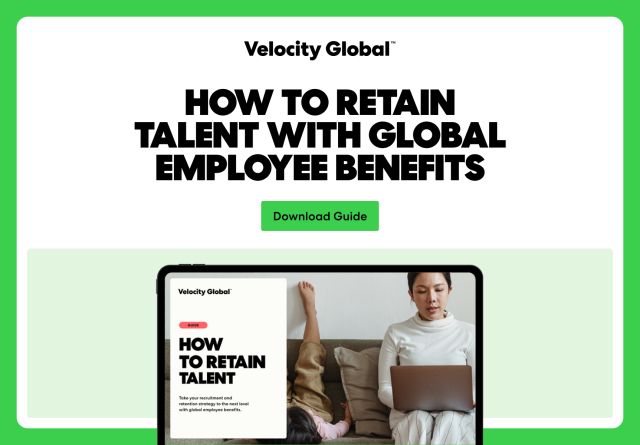The well-educated and skilled workforce of The Netherlands offers exciting opportunities for foreign employers seeking expansion into the Dutch market.
Still, companies engaging talent in The Netherlands must understand and comply with the country’s local labor laws and mandatory benefits, including its maternity leave policies.
The Netherlands is known for its generous leave benefits that promote positive work-life balance. Dutch employment law strongly supports expecting parents and those caring for children, including guaranteeing new mothers 100% of their salary throughout their entire maternity leave period.
The following guide discusses statutory maternity leave and The Netherlands' required paternity, adoption, and parental leave policies.
Maternity leave in The Netherlands
Mothers in The Netherlands are entitled to 16 weeks of paid leave to have a baby. Dutch employment law splits this leave between pregnancy leave and maternity leave.
Pregnant mothers may take four to six weeks of paid pregnancy leave before the due date and 10 to 12 weeks of paid maternity leave after childbirth, for a total of 16 weeks. Employees are entitled to at least 10 weeks of maternity leave after childbirth.
In the case of multiple births, the mother’s leave extends to 20 weeks, with eight to 10 weeks allotted for pregnancy leave.
If the baby is born before the pregnancy leave starts, the 16-week leave begins the day after birth. If the baby is born past its planned due date, the maternity leave period begins the day after childbirth.
A pregnant employee may also take pregnancy check-ups and related appointments during working hours without using leave or holiday hours.

Paternity leave in The Netherlands
Fathers and partners, including same-sex partners, are entitled to one week of paternity leave after delivery, which they must take within four weeks of childbirth. They receive 100% of their salary during their one week of paternity leave.
Fathers and partners may also take an additional five-week unpaid paternity leave within the first six months of birth. They may spread this leave over the first six-month period. Employees are entitled to 70% of their salary during this extended paternity/partner leave for a maximum of €179.58 per day.
Employees who take unpaid leave can claim benefits from the Employment Insurance Agency (UWV).

Adoption and foster leave in The Netherlands
If an employee adopts or fosters a child, both parents have the right to six weeks of paid adoption and foster care leave. The employee must take this paid leave somewhere between four weeks before the child’s arrival and 22 weeks after.
Employees are entitled to adoption allowance or foster care benefits and can receive up to 100% of their salary during their leave.
Parental leave in The Netherlands
Parental leave in The Netherlands allows employees with children under eight years old to take time off. Parental leave applies to parents, parents of adopted or fostered children, and primary caretakers of children under eight.
Parental leave in The Netherlands equals the employee’s weekly working hours multiplied by 26 per child under eight years old. For example, according to a 40-hour work week, eligible employees receive 1,040 hours, or 26 weeks, of parental leave for each child under eight.
If the employee takes parental leave within the first year of childbirth, they receive paid parental leave at 70% of their wages for nine of the 26 weeks, with a maximum of €179.58 per day. If the employee’s daily income is less than the minimum income, they may be entitled to a supplemental income according to the Supplementary Benefits Act.
If an employee does not use all of their paid parental leave within the first year, they can take the remaining parental leave unpaid.
Care leave
Employees may also take short-term care leave to provide essential care to someone who is ill or in need, including children and family members. This leave equals twice the number of hours worked per week in 12 months, and the employee receives 70% of their wages but never less than the minimum wage.
Employees may also request long-term care leave if a child, partner, or parent is seriously ill and requires care. Employees taking long-term care leave are entitled to a maximum of six times the number of hours they work per week in 12 months. However, employers do not continue paying the employee’s wages.
During care leave, the employee’s statutory holidays continue to build up.
Learn how to easily administer competitive, compliant, market-tailored benefits packages to your talent in The Netherlands and across borders:

Maternity leave in The Netherlands: FAQs
The following content discusses common questions regarding maternity leave in The Netherlands.
Is maternity leave paid in The Netherlands?
Yes, employees in The Netherlands receive both paid pregnancy leave and paid maternity leave. All leave policies in The Netherlands are regulated and paid for by The Netherlands’ Employee Insurance Agency, Uitvoeringsinstituut Werknemersverzekeringen (UWV).
Mothers on pregnancy and maternity leave receive their full taxable salary, with a maximum daily pay of €256.54. If the mother’s daily income is less than the minimum income, they may be entitled to supplementary income.
Self-employed mothers receive benefits under the Maternity Benefit Scheme for the Self Employed. The amount they receive depends on their total annual income before childbirth and cannot exceed the minimum wage.
How long is maternity leave in The Netherlands?
Maternity leave in The Netherlands is 16 total weeks, split between six weeks of pregnancy leave before childbirth and 10 weeks of maternity leave after childbirth.
Can maternity leave be extended in The Netherlands?
Maternity leave in The Netherlands can extend beyond the allotted 16 weeks under certain circumstances.
If the baby is born later than the due date, the employee’s maternity leave still begins after the actual birth. Therefore, the total leave period may end up longer than 16 weeks, depending on how long the pregnancy leave period lasted.
If the baby is hospitalized immediately after birth, the employee may take up to 10 weeks of additional leave during hospitalization. Regular maternity leave begins the day after the mother and baby leave the hospital.
If the baby is hospitalized for more than seven days directly after birth or during the maternity leave, the employee may have a right to longer maternity leave. If the mother dies in childbirth, her partner is entitled to maternity leave.
When does maternity leave start in The Netherlands?
Maternity leave starts the day after the baby is born. Pregnancy leave may begin as early as six weeks before the baby’s due date.
How does maternity leave in The Netherlands work for multiple births?
Mothers having multiple births, such as twins or triplets, receive 20 total weeks of leave, with eight to 10 weeks for pregnancy leave and 10 to 12 weeks of maternity leave after birth.
Provide compliant employee benefits in The Netherlands and 185+ countries
Maternity, paternity, and parental leave benefits play a significant factor in attracting, incentivizing, and retaining top talent worldwide. Companies interested in hiring employees in The Netherlands must understand all statutory requirements to maintain compliance, as well as commonly expected supplemental benefits, to gain a competitive advantage in the global market.
As an industry-leading employer of record (EOR), Velocity Global handles employee benefits on your behalf so you can attract and retain top talent in The Netherlands without the hassle of researching and administering compliant, competitive benefits to your distributed workforce.
Our Global Benefits solution assists companies in providing market-specific benefits that comply with The Netherlands’ employment policies. Our team of experts crafts competitive benefits packages that go above and beyond the minimum requirements to ensure equitable rewards across your distributed workforce and help you retain top talent.
Attract quality employees in The Netherlands and beyond with competitive global benefits. Contact Velocity Global to start building and supporting your distributed team today.
Disclaimer: The intent of this document is solely to provide general and preliminary information for private use. Do not rely on it as an alternative to legal, financial, taxation, or accountancy advice from an appropriately qualified professional. © 2024 Velocity Global, LLC. All rights reserved.



